We Aim To Be Masters In Paint, Polish & Protect- Sharad Malhotra
- By T Murrali
- December 18, 2020

Q: Globally, the car care market is bigger than the automotive aftermarket for paints. How is it in India. What is your current share in car care business and how do you plan to enhance it?
Malhotra: Car Care business is a new domain for us and we are just starting out. Globally and in India too, this is a large business area with potentially a larger market size than automotive aftermarket for paints. We are studying this business and working out our strategy. We will be offering our car care products as a product solution, through online and other channels, and as a service directly by us and our partners as well. This is an exciting area and you will soon see us becoming more visible.
Q: Your intent was to become a solutions partner, expanding into different areas like car care etc. Can you update on this journey?
Malhotra: We see ourselves emerging as a total solutions partner for customers, with car care encompassing refinishing of the paint as well. We call ourselves an augmented Finishing solutions company so our purpose is to provide excellent, unmatched finishing solutions for any surface, including cars.
This positions us quite uniquely in the market as no other player will be able to integrate paint into the car care proposition.
 Q: Following car care technologies from the parent company in Japan may not be helpful as the geographical conditions are different in India. How do you customise it? Is your Indian R&D helping it?
Q: Following car care technologies from the parent company in Japan may not be helpful as the geographical conditions are different in India. How do you customise it? Is your Indian R&D helping it?
Malhotra: While we leverage the knowledge and technology developed by our parent and sister companies, we essentially follow the market requirement. So we are in terms of technology and developments. We make for India, make in India and provide our solutions across India. That is how we operate.
For the automotive aftermarket business, our R&D set up in India is quite extensive and well resourced. Our technology centre in Manesar serves us well – both for the Indian market and as a key resource for the global business. This is where we do bulk of our developments – whether for paints or car care products.
Q: Till few years ago ceramic coating was popular in India. What is the current trend and how do you cater to the every changing customers’ expectations?
Malhotra: Ceramic coating is still quite popular but there are other products available too for the consumer. Our approach is to use our knowledge of surfaces and surface coatings to create unique and differentiated products for our customers. In this respect, we are developing new technologies. One of the unique products we have in this space is our CyGlaz clearcoat 9905 which creates a very strong film that far exceeds the performance of any normal coating or even a ceramic coating. So, there is a lot more in our kitty and we will soon be launching such products and services.
Q: What is Nippon’s USP? What are the compelling reasons for customers to look for NPI?
Malhotra: Every company tries to build its own compelling solution. Our differentiation comes from our widespread dealer network, our presence in over 1,000 towns in India, our unique products and services, our amazing sales and service team, our embracing of new ideas and platforms, our willingness and ability to customise, our short TAT between concept to creation and many more things. And all this stems from our unique DNA which makes us Nippon Paint. And this DNA is what makes us click across Asia Pacific and makes us the force that we have become.
The automotive aftermarket space is relatively very new for Nippon Paint and it is only in 2014 that we started focusing on this space as a separate, identified international business. So all that we have created is only in a short period of five to six years as compared to our illustrious competitors who have decades of legacy and knowledge. But I also feel that our freshness and ideas are helpful to give us a different perspective of the industry and emerging opportunities our uncluttered mind gives us speed to execute.
Q: Tell us about the Velocity Repair System; how many outlets are functional now and what the target for the next five years?
Malhotra: When we launched our Velocity Repair programme, there were not too many takers for it. Now, people who have used this product swear by it and use it extensively. In the first round, we focused on creating branded Nippon Paint Xpress Centres and set up around 50 such centres across India. Now, we take the product proposition across the country and make it available to all our major partner workshops. So, we have around 300 active users for this product line in India at this moment.
Our product proposition is still fresh and no competitors have been able to develop a similar system. In the future, we will continue to expand this portfolio and workshop network and take this to over 1,000 outlets. The key idea is for the car owner and not just the repair centre to experience this service and that’s what we are working on now.

Q: The secondary car market is always larger than the primary market and it is growing even bigger with the pandemic induced used-car sales. What kind of opportunity does this give you?
Malhotra: We are actively focused on the used car market and are working with leading used car players on the refurbishment side of things. Our solutions which give fast, efficient and high quality repairs make us the ideal paint partner for such used car companies and we are leveraging that capability.
In this field, we are also working on the concept of providing painting services and not just paint. Going forward, we see the refurbishment business relating to our used car customers growing into a very sizeable part of our business.
Q: What are the challenges NPI faced during the lockdown and COVID induced New Normal?
Malhotra: Several challenges; and we used this period to innovate. We relooked at our customer propositions. We developed and launched new products. We created new services. We set up new manufacturing concepts. We distributed our manufacturing from a single core to multiple units. We streamlined our supply chain. We localized more products and raw materials. We trained our workforce. We sharpened our optimisation focus. We developed new digital solutions. We empowered our managers. We cut our fat and become more lean and flexible. And yes, we didn’t forget our social responsibility and supported the painter community at this turbulent time.
So, in that sense, Covid-19 has been a great accelerator for us. Things that would have normally been done in a few years have been accomplished in a few months.
Q: What is the current status of the imported parts and accessories in India after the ban on imports from China? Does it anyway help affect you?
Malhotra: The paint industry has a fair share of raw materials and finished goods coming from China. At our side, we are not overly dependent on sourcing our products from China and more so, now our supply chain is more localised than ever. Yes, certain products sourcing from non-China sources is challenging but we are looking ahead at more localization and more diversified sourcing.
Q: With the life of automotive paints increasing due to technological advancements, how is the revenue being sourced nowadays?
Malhotra: We always aim to provide customers with more durable products. Our business is not impacted by the life of paint, but by the differentiation of the solutions that we offer. Our primary business in the aftermarket relates to collision repair which is not dependent on life but repair of paint due to accidents. Furthermore, as we expand into new products and new domains like wood coatings, car care, bus and application vehicles painting and light industrial coatings, our dependency even on collision repair induced paint consumption is also going down.
We always say – give the customer the best products and services and he will refer more customers to us. Give him a shoddy product with poor durability, we will shoot ourselves in the foot. So, we are absolutely clear that technology induced advancement of paint durability will always stand us in good stead.
Q: Can you tell us about your short-term and long-term plans?
Malhotra: In the short term, our plan is to utilise the learnings from the Covid induced lull to our advantage. As mentioned before, we have done a lot of things that will now help us. So, we will leverage these developments, regain our business and be back on growth. To that extent, October 2020 has been a good month where we were back on double digit growth and that gives us the satisfaction that we are back on track.
From the longer term perspective, the lockdown period has helped us to develop an alternative view about our business approach. We aim to be masters in Paint – Polish – Protect and we will be focusing on the various dimensions of this new strategy in the next two to three years. We are here to stay. And we are future ready. (MT)
- IAC India
- Lumax Group
- IAC Group
- Mahindra
- VECV
- Maruti Suzuki India
- Skoda
- Volkswagen
- Stellantis
- Sunil Koparkar
IAC India Bets On Engineering Depth & Diversification, Targets 20% CAGR Growth Till FY2030
- By Nilesh Wadhwa
- February 28, 2026

Sunil Koparkar, Managing Director, IAC India, outlines the company’s strategy to reduce customer concentration, expand exports and leverage group synergies following its integration with the Lumax Group.
As India’s automotive interior market evolves towards premiumisation, localisation and faster product cycles, IAC India, part of the Lumax Group, is repositioning itself beyond a single-customer dependency model – without diluting its core partnerships.
IAC India continues to derive a significant share of its revenue from Mahindra’s passenger vehicle business. While the concentration remains high, Koparkar is clear that diversification will be driven through growth rather than dilution.
“Mahindra will always be our primary customer. We have a very strong strategic partnership. But we are also working on expanding with other OEMs and in the commercial vehicle space. Our goal remains a 20 percent CAGR,” he says.
For FY2025, IAC India USD 140 million in revenue, and is targeting a 20 percent growth in FY2026. The company counts Mahindra as its primary customer with almost 78 percent of its business coming from them, while Maruti Suzuki India (12%), Volvo Eicher Commercial Vehicles (5%), Skoda-Volkswagen (3%) and Stellantis (1%) contribute towards the remaining business.
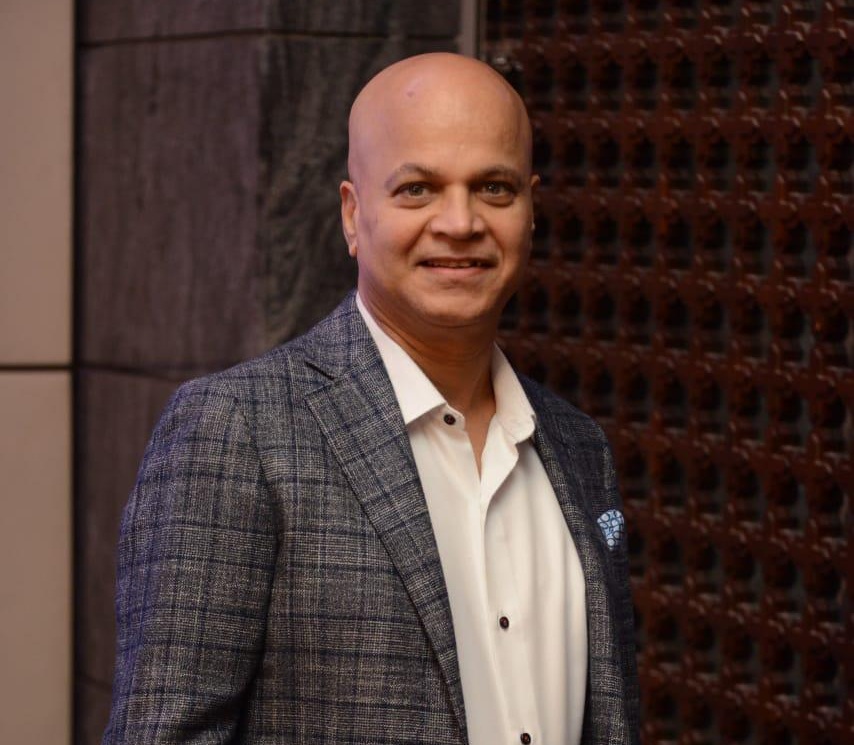 What’s more, responding to the company’s expansion plans, Koparkar revealed, that IAC Group, in addition to introducing new products, is also in talks with new-age players who have just entered Indian market (and also planning too) for supplying products.
What’s more, responding to the company’s expansion plans, Koparkar revealed, that IAC Group, in addition to introducing new products, is also in talks with new-age players who have just entered Indian market (and also planning too) for supplying products.
Currently, passenger vehicles account for roughly 90 percent of the business, with commercial vehicles forming the balance. Value-wise, Koparkar expects CV contribution to rise, even if percentage splits remain broadly similar due to the rapid growth of PV volumes.
Responding to a query on the potential growth from the CV segment, Koparkar said, “There is clear potential in CV interiors. As the CV market moves towards more comfortable cabins — with features like airbags, HVAC and infotainment — the opportunity for interior suppliers increases. Through Volvo Eicher, we have already helped drive that trend in India.”
When asked about the company’s expansion plans, Koparkar also stated that IAC Group is open to expanding to new regions as it aims to operate closer to its customers. One of the potential new projects for the company could very well be Chennai, as the company is in early talks with a new CV customer as well as VinFast.
Engineering as a Standalone Growth Lever
A key pillar of IAC India’s strategy is its expanding engineering capability. The company has been scaling up its R&D and product development team and increasingly positioning engineering services as a distinct revenue stream.
The company at present, employs over 300 engineers in India, which it aims to scale it upto 400-plus by next year and 500-plus in the coming few years.
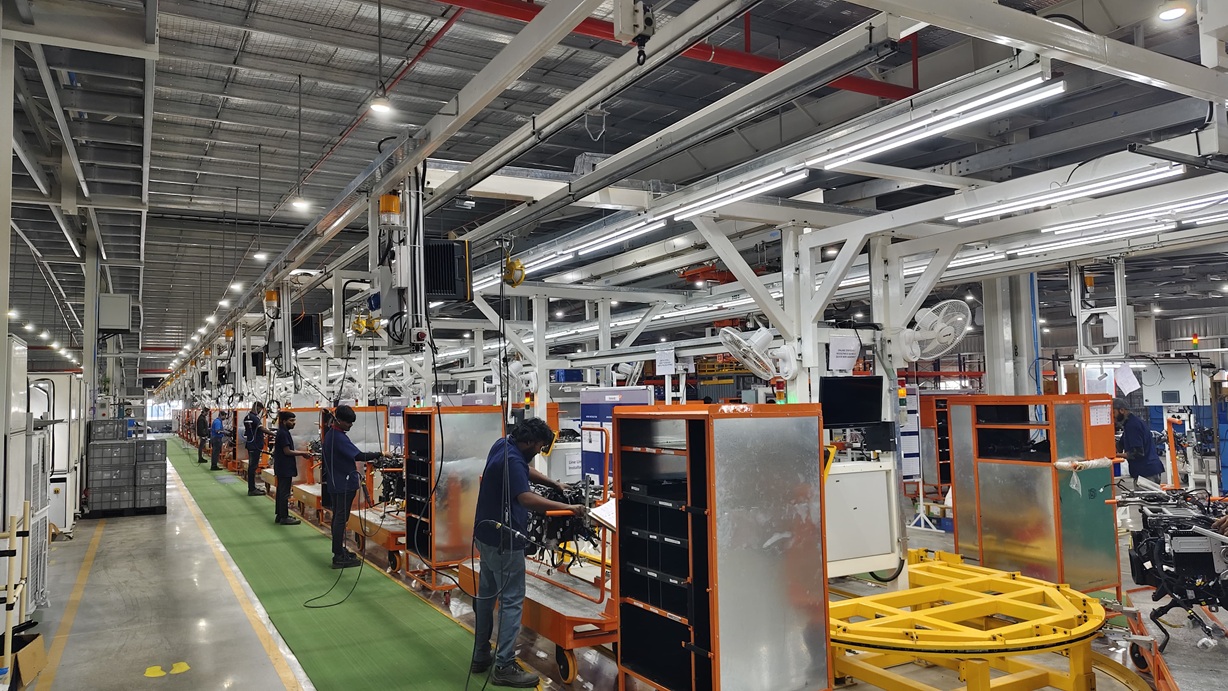
Historically, the Indian Engineering Centre supported the global IAC Group. “We were primarily the IAC Group engineering development centre. We will continue to provide those services. But now, besides global support, we are also offering engineering services to local OEMs,” Koparkar explains.
These services span studio collaboration, basic product design, CAE analysis and prototype development. In some cases, this can potentially evolve into full-scale supply programmes.
Importantly, innovation is now being formalised locally. “This year alone, we are in the process of filing about 30 patents,” he says. Earlier, intellectual property was subsumed under the global entity; now, filings are being initiated in India.
R&D investment remains aligned with group benchmarks at around 1.5–2 percent of revenue.
Exports: Measured Ambition
In terms of export potential, it currently contributes less than 5 percent towards the revenue, primarily through smaller kinematic parts. Direct exposure to the US market is negligible.
“Tariff-related uncertainty does not affect us because we do not export to the US,” Koparkar says. “Logistically, it does not make sense to ship our large interior parts there.”
Europe remains the primary export target. “The opportunity lies in leveraging our design capabilities and local development strengths. If logistics can be managed efficiently, there is room to grow.”
He also sees the Lumax Group’s aftermarket division as a future vehicle for export expansion.
Localisation and Supply Chain Resilience
On the localisation front, IAC India has made significant progress. “Last year was the first time we were able to localise over 99 percent of our tooling and development in India,” Koparkar states. Machinery on shop floors is largely localised, with only certain raw materials still imported.
The semiconductor crisis, he adds, had minimal direct impact. “We do not source electronics for our products — that is handled by the customer. However, from a development perspective, we are evaluating secondary substitutes for imported components, so we are prepared in case of disruptions.”
Premiumisation, Sustainability and AI
Premiumisation is currently the dominant interior trend. “Customers are moving away from basic plastics to more premium-feel interiors. Electronification is a big driver,” Koparkar says.
Sustainability, however, remains nascent in India. “There is no specific push for sustainable materials yet. What OEMs are looking for is lightweighting to meet upcoming CAFE norms. If a sustainable material delivers significant weight reduction, then it becomes serious.”
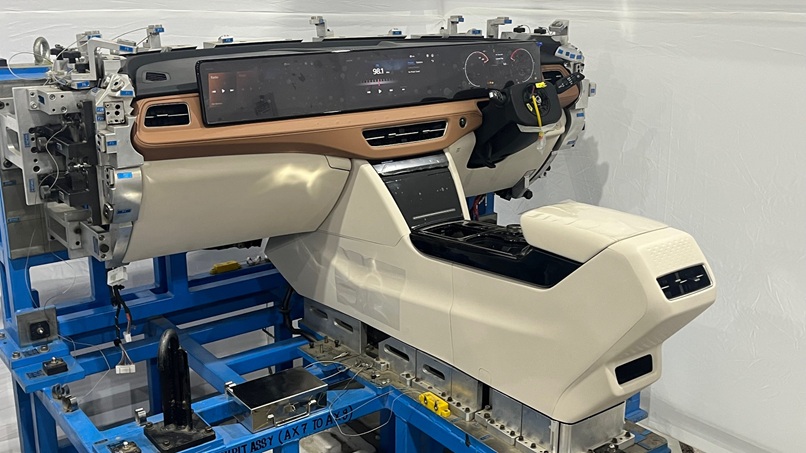
He points to jute, coir and bamboo fibres as potential alternatives but stresses that ecosystem-level collaboration is essential. “Unless a circular economy develops around us, sustainable materials will struggle to scale.”
On automation, operations across IAC’s six plants are roughly a 50:50 mix of automated and manual processes, depending on volume justification. Cobots and semi-automation are used where full automation does not offer viable returns.
AI, meanwhile, is expected to influence design more than manufacturing. “We see AI helping us accumulate design learnings and reduce design cycle times. Its impact will be more visible in engineering services than on the shop floor.”
Faster Development Cycles
Product life cycles are shrinking rapidly. “It used to take five years to develop a car,” Koparkar reflects. “With the XUV700, we worked with the customer to shrink that to 42 months. EVs are being developed even faster.”
As development timelines compress and interiors become more technology-intensive, IAC India is betting on engineering depth, localisation strength and group synergies to sustain its 20 percent growth ambition – while steadily broadening its customer and geographic footprint
- Rosmerta Technologies
- The Curious Bunch
- CII National Conclave on Road Safety
- Dr Rajesh Mohan
- Ravi Krishnamoorthi
- road safety
Rosmerta Launches Road Safety Comic Book For Schools
- By MT Bureau
- February 27, 2026
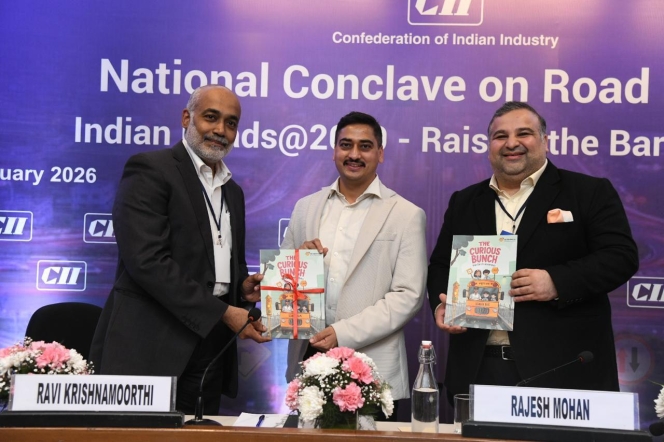
Rosmerta Technologies has launched a comic book titled ‘The Curious Bunch’ at the 3rd Edition of the CII National Conclave on Road Safety. The publication is designed to introduce road safety awareness to children.
The initiative aligns with the Government of India’s ‘4E’ strategy for road safety, which focuses on Engineering, Education, Enforcement and Emergency Care. The comic book aims to address the 168,000 road fatalities reported in India in 2022 by fostering safe habits at a school level.
The comic book uses illustrations to present road scenarios, including pedestrian conduct, school bus safety, traffic signals & the use of helmets, seatbelts and child restraint systems. By educating children, the company intends to influence the behaviour of parents and the wider community.
Rosmerta, a provider of mobility solutions, currently operates technology systems for automated driving tests and AI-based monitoring. The launch of ‘The Curious Bunch’ marks an expansion of its activities into the education pillar of the national safety framework.
Dr Rajesh Mohan, DCP, Gurugram Traffic, said, “When we educate children and instil strong moral and ethical values, the impact travels far beyond the classroom. Children naturally share what they learn. They question, they explain, and they influence conversations at home. In many ways, they become powerful advocates, encouraging their parents to be more aware, more responsible, and more engaged. Over time, this awareness translates into action, because parents are also drivers, commuters, and decision-makers on the road.”
Ravi Krishnamoorthi, Group President, Rosmerta Technologies, said, “Every road accident statistic hides a parent’s anxiety. In 2022 alone, India reported over 168,000 road accident fatalities, according to government data. Road safety is not merely about compliance; it is about compassion and collective responsibility. When a child understands why a red light matters or why a helmet can save a life, they don’t just learn a rule - they become ambassadors of safety within their families and communities. Through ‘The Curious Bunch’, we aim to nurture this awareness early, because the habits we shape in children today will define the safety culture of our nation tomorrow.”
- Maruti Suzuki India
- Transport Department of Tamil Nadu
- Automated Driving Test Tracks
- ADTT
- M K Stalin
- RTO
- CMVR
- Rahul Bharti
Maruti Suzuki Commissions Seven Automated Driving Test Tracks In Tamil Nadu
- By MT Bureau
- February 27, 2026
Maruti Suzuki India, in partnership with the Transport Department of Tamil Nadu, has announced the commissioning of seven Automated Driving Test Tracks (ADTTs) in the state. The facilities were inaugurated by the Chief Minister of Tamil Nadu, M K Stalin.
The tracks are located at Regional Transport Offices (RTOs) in Coimbatore (Central), Tiruvannamalai, Krishnagiri, Madurai (North), Sivagangai, Dindigul, and Tiruchirappalli (West). These sites form part of a Memorandum of Agreement to automate ten tracks across the state, with the remaining three at Tirunelveli, Tuticorin and Marthandam scheduled for operation shortly.
The ADTTs are designed to evaluate applicants for two-wheeler and Light Motor Vehicle (LMV) licences. The system removes human intervention from the evaluation process to ensure objective testing according to the Central Motor Vehicle Rules (CMVR).
Key technical components include:
- Video Analytics: High-definition cameras to monitor vehicle movement and path adherence.
- Sensors: Radio Frequency Identification (RFID) and Harnessing AutoMobiles for Safety (HAMS) technology.
- Identification: Face-recognition systems to verify candidate identity.
- Results: Integrated IT systems that generate test results automatically based on real-time data.
The carmaker has commissioned 56 ADTTs across eight states, including Uttar Pradesh, Delhi, and Bihar. Following the completion of agreements with Rajasthan and Andhra Pradesh, the company’s footprint is expected to reach 81 tracks nationwide.
Rahul Bharti, Senior Executive Officer, Corporate Affairs, Maruti Suzuki India, said, “As part of Maruti Suzuki’s road safety initiatives implemented across multiple states, we are partnering with the Government of Tamil Nadu to strengthen the driver licensing evaluation process through the deployment of 10 Automated Driving Test Tracks (ADTTs). Equipped with high-definition cameras and advanced analytics, these ADTTs enable a comprehensive, efficient, and transparent assessment process. It eliminates any human bias and ensures that only skilled drivers are awarded a license.”
“According to data shared by the Ministry of Road Transport & Highways, India witnessed 1.77 lakh road accident deaths in 2024. Promoting disciplined driving practices and ensuring rigorous driver evaluation are vital to prevent road accidents and augment road safety across the country,” he said.
BYD To sponsor BVRLA Annual Dinner 2026
- By MT Bureau
- February 26, 2026
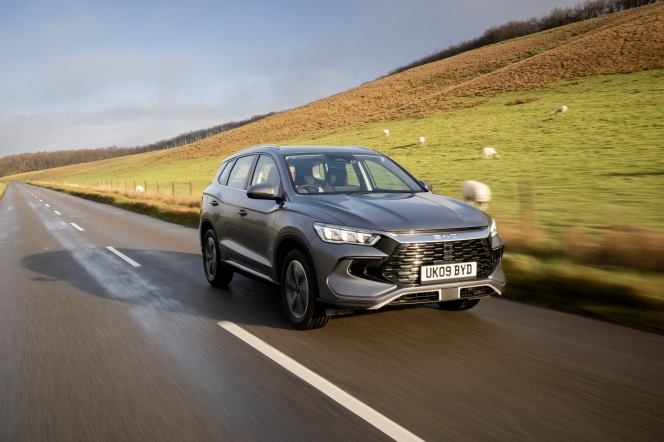
BYD, the world’s leading manufacturer of New Energy Vehicles, will once again serve as the headline sponsor for the British Vehicle Rental and Leasing Association (BVRLA) Annual Dinner in 2026. This marks the third consecutive year the company has supported the prestigious event, which is set to take place on 4 March 2026 at the JW Marriott Grosvenor House Hotel on Park Lane, London. The dinner is widely recognised as the premier gathering for professionals across the rental, fleet management and leasing sectors.
Through its ongoing sponsorship since 2024, BYD reaffirms its commitment to this vital segment of the UK automotive market. The company’s expanding presence was underscored in 2025 by the introduction of several new models, including the SEALION 7, DOLPHIN SURF, SEAL 6 Saloon and Touring and the ATTO 2. These launches contributed to significant sales figures, with 21,824 units delivered to fleet customers and 5,964 to the rental sector. The momentum has continued into 2026 with the debut of the SEALION 5 DM-i, while the ATTO 2 DM-i and ATTO 3 EVO are expected to arrive shortly. Supporting this growth is a dedicated UK fleet team of 11 specialists, offering tailored product and service expertise.
The BVRLA represents around 1,000 member organisations, ranging from SMEs to large public companies, all operating within or alongside the UK’s vehicle rental and leasing industries. By engaging with government and upholding professional standards, the association enables its members to provide safe, sustainable and accessible transport solutions. This year’s Annual Dinner will feature the presentation of the Industry Hero Awards and live entertainment from award-winning comedian Tom Ward, celebrating excellence across the sector.






Comments (0)
ADD COMMENT